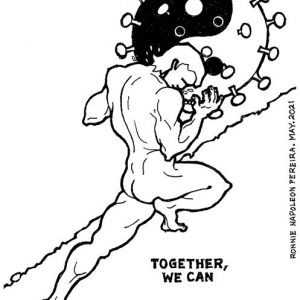By Élan,
YIN n. (in Chinese Philosophy)1 the passive female principle of the universe contrasted with yang – origin Chinese “feminine, moon.”
YANG n. (in Chinese Philosophy) the active male principle of the universe contrasted with yin – origin Chinese, “male genitals, sun.”
The widespread discussion of COVID-19 reflects the Chinese Philosophy of Yin and Yang.
Balance is crucial, thus, out of crisis may emerge opportunity, in the universal operation of these two principles.
In one of the most interesting and wide-ranging discussions2 I have read about on COVID-19, Martin Wolf, chief economics commentator of The Financial Times, was interviewed by Rory Clarke, chief editor of The OECD Observer.
During that interview, Wolf predicted that, “We are going to survive,” comparing COVID-19 to a, “colossal storm which we know will survive – but don’t know what shape our ship will be in after it’s over.”
He cited our “lack of preparation,” and our “extreme failure to cooperate effectively globally.”
The interview elicited many suggestions that could promote new insights into future opportunities for meaningful changes – most notably – his advice to young economists: “Economics is incredibly important, but it isn’t enough…don’t think of this as…the tool through which all problems can be resolved that are relevant to human society. Human, social and political development is much more complicated than that.”
COVID-19 has made clear, the need for this holistic approach. The argument, for example, over which priority should take precedence – our health or the economy – arises out of the mistaken notion that we can’t have both.
What an opportunity to challenge the financialization of our economy that has left the REAL economy high and dry, and at the mercy of those with deep pockets and shallow values – usurping our democratic right to something better than what John McMurtry has described, in his book by that title as, The Cancer Stage of Capitalism.
One study, conducted by a team of seven people3, concluded that, indeed, “Prioritizing health could help rebuild economies,” and – with reference to specific data – that, “Rethinking health as an investment, not just a cost, could accelerate growth for decades to come.” The truth about money-creation further attests to our democratic and sovereign capacity to meet our health needs without sacrificing our economy.
Could anything be more insane than that the human race should perish – because we couldn’t afford to save ourselves? (Dr. John Hotson)

The team researching the relationship4 between health and the economy concluded: “Our research leaves us with a strong conviction: improving health could be a societal and economic game-changer. As the world confronts the pandemic, it has a once-in-a-generation opportunity…to advance broad-based health and prosperity dramatically.”
The issues of crisis are perhaps far more obvious than the opportunities which they may create or illuminate.
The loss of human life world-wide – more than half a million Americans in less than one year – for example, is a dramatic wake-up call on many fronts.
COVID-19 has exposed a general lack of preparedness, and many structural weaknesses in our political-economical system.
Livelihoods have been wiped out, and in their stead, debt and social disruption have become a widespread threat.
In wide-ranging effects of the disease, along with coping strategies – like isolation, for example – have ruptured relationships and damaged psyches.
Arguments have developed, like that questioning priorities – notably that between health and the economy.
Donald Trump, for example, ignoring the advice of critics who warned that lockdown was necessary to protect lives, declared that, “We cannot let the cure be worse than the problem.”
The late Dr. John Hotson once emphasized that, “money is not the problem. It was a wonderful invention – right up there with fire, the wheel, and the steam-engine.”
The problem lies in the way money is created, and who gets to do that. John spent his life teaching the truth about money.
COVID-19 has demonstrated, once again, the validity and the successful exercise of our constitutional right to create money.
If we can do that to deal with COVID-19, we can do it to deal with other problems like inequality and environmental issues. It’s up to us to build on what we can learn from COVID-19, in framing future policies.
Endnotes
1. YIN and YANG – Oxford English Dictionary.
2. Martin Wolf interview on OECD podcasts: “Making Sense of the World Economy under COVID-19,” September, 2020.
3. “How Prioritizing Health Could Help Rebuild Economies,” McKinsey Global Institute, July 8, 2020. By Penelope Dash, Grich Dorling, Katherine Linzer, Aditi Ramdorai, Jaana Remes, Dr. Christine-Anne Rutter (Dr. Kristin-Anne Rutter on the website) and Shubham Singhal.
4. Ibid.





